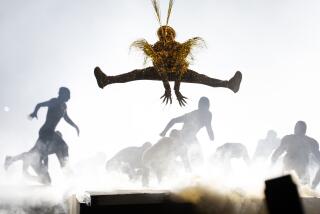Olympics Open With Calls for Yugoslav Peace
- Share via
BARCELONA, Spain — Amid war in Yugoslavia and rumors of war in the Middle East, the Summer Olympics, a quadrennial 16-day sports festival organized to promote peace and harmony among nations, formally opened Saturday with more athletes from more countries participating than ever before.
About 10,000 athletes and officials from 172 countries were represented in a passionate and vibrantly colorful opening ceremony at Montjuic Stadium, built more than six decades ago on a mountain overlooking the capital city of Spain’s proud Catalan region and the Mediterranean Sea.
It is the first time since 1972 that the Summer Olympics have not been marred by a boycott of any of the movement’s major countries, leading Juan Antonio Samaranch, the International Olympic Committee president, to call these the “universal games.”
But although he delivered a traditional message of peace and brotherhood, punctuated with a flyby of military jets painted pink and silver as a symbol of nonaggression, the 65,000 spectators, as well as those who watched a television feed that was available to an estimated 3.5 billion people throughout the world, were reminded of the ongoing conflict between Yugoslavia and its former republics.
Barcelona Mayor Pasqual Maragall, the grandson of Catalonia’s most famous poet, read from a message he received Friday from United Nations Secretary General Boutros Boutros-Ghali, who asked him to “publicly call for . . . a truce in the former Yugoslavia, which would be the Olympic Truce of classical tradition.”
More in the tradition of the ancient Olympics, in which wars were halted to allow safe passage of athletes to the Games but not necessarily during the competition, the IOC sent a charter plane Friday to war-ravaged Sarajevo, a host city for the Winter Olympics eight years ago, to provide transportation to Barcelona for athletes and officials from Bosnia-Herzegovina.
As a result of the war in Bosnia-Herzegovina, the U.N. Security Council adopted sanctions in May against Yugoslavia, including a ban on sports contacts. Through a series of compromises between the IOC and the United Nations, Yugoslav athletes in individual sports, but not teams, gained entry into the Games last week. They were not allowed to join the opening ceremony’s parade of nations.
Among the first delegations to march into the stadium during the parade, the Bosnians received an enthusiastic response from the crowd, perhaps the second-loudest of the night behind the host Spanish.
Other nations that have gained U.N. and IOC recognition since the last Summer Olympics at Seoul in 1988, including Croatia, Slovenia, Estonia, Latvia, Lithuania and Namibia, also were greeted warmly, perhaps because their struggle for independence strikes a chord with the Catalans.
Of Spain’s 17 autonomous regions, Catalonia is the most nationalistic, and since Barcelona won the right to organize the Summer Olympics six years ago, city and regional political leaders have insisted that the Games belong more to Catalonia than to Spain.
Although regional leaders lost a campaign that would have enabled Catalan athletes to march Saturday night behind their own flag, Samaranch, a Barcelona native, used his considerable influence to have Catalan adopted as one of the Games’ official languages, along with Spanish, French and English. To avoid offending the Catalans or the Spanish, he and Maragall delivered their opening ceremony addresses in all four languages.
The Catalan flag and anthem also were included in the opening ceremony, significant to Catalans because both were banned during the 36 years that fascist dictator Gen. Francisco Franco ruled Spain before his death in 1975.
In the most poignant moment of Saturday night’s celebration, a choir sang “The Song to the Flag,” which became Catalonia’s unofficial anthem during the Franco years, while more than 600 people performed the region’s traditional dance, the sardana. In fact, the entire ceremony was punctuated with brilliant colors as if to symbolize the vibrancy of the region.
In another segment of the program loaded with symbolism, dancers simultaneously performed popular dances, including the flamenco, from the country’s other regions. The conglomeration appeared to be poorly choreographed. In fact, as explained by Catalan scholar Miquel de Moragas of the Autonomous University of Barcelona, it was intended to convey a message that Spain’s regions are better when they stand alone.
Concerned that the pro-Catalan sentiment might become anti-Spanish, Maragall and other political leaders here appealed to those who had tickets for the opening ceremony to treat the country’s flag and the man most closely associated with Spain, King Juan Carlos, with respect.
To assure that the king would not be jeered, organizers planned for the Catalan anthem to be played at the same time he entered the stadium, and he received a long, generous ovation. He was on his own after that, but he was up to the challenge. Before he officially declared the Games open later in the program, he greeted the crowd in Catalan.
His son, the 24-year-old Prince Felipe de Borbon y Grecia, who is competing here in yachting, was chosen to carry Spain’s flag in the opening ceremony. The crowd saved its most emotional and enthusiastic response for the Spanish, the last of 172 delegations to enter the stadium.
Marathoner Francie Larrieu Smith, a 39-year-old five-time Olympian who competed for UCLA and now lives in Denton, Tex., was elected to carry the U.S. flag by her teammates. The United States has the largest number of athletes here, 610. They were greeted respectfully, if not particularly enthusiastically, by the crowd, although athletes from other countries mobbed the U.S. team’s National Basketball Assn. players, especially Earvin (Magic) Johnson, during the ceremony.
More to Read
Go beyond the scoreboard
Get the latest on L.A.'s teams in the daily Sports Report newsletter.
You may occasionally receive promotional content from the Los Angeles Times.







